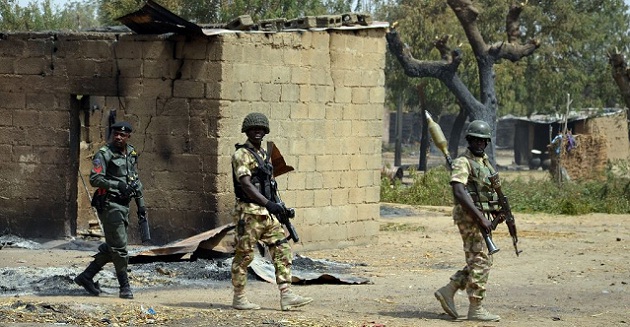
Kano, Nigeria | AFP | Nigeria’s Muhammadu Buhari will visit troops on the frontlines of the Boko Haram conflict on Wednesday and is to dispatch his defence minister to Chad following a jump in attacks.
The presidential visit comes after months of deadly raids by the IS-affiliated jihadists on military bases which have left scores of troops dead or missing in the volatile northeast.
The 75-year-old former general, who is running for re-election in February presidential polls, is under pressure over claims the nine-year Islamist insurgency was close to defeat.
In a posting on Twitter on Monday, presidential spokesman Bashir Ahmad said Buhari would attend an army conference in Maiduguri as well as address troops to boost their morale.
“President Muhammadu Buhari has cancelled his planned official visit to Benin, Edo State tomorrow, to visit Maiduguri, Borno State on Wednesday,” he wrote.
Also this week, Defence Minister Mansur Dan-Ali will hold talks with his Chadian counterpart General Daoud Yaya over “strengthening the operations” of the Multinational Joint Task Force fighting Boko Haram in the Lake Chad region.
AFP has reported at least 17 attempts to overrun army bases since July.
Many of the attacks have been claimed by the Islamic State West Africa Province (ISWAP), a faction of Boko Haram.
– A change in strategy –
In the latest attack on November 18, militants raided a base in Metele village near the border with Niger leaving at least 43 soldiers dead, although troops who survived put the death toll at more than 100.
“There is need for a change in the war strategies. Our troops should be more proactive rather than reactive,” said security consultant Don Okereke to AFP.
“We have to find out why the insurgents have more superior firearms than our soldiers. What has happened to our huge defence budget?”
When he was elected in 2015, Buhari pledged to end the insurgency and has used military successes against the militants as a sign of his administration’s progress.
But the recent assaults have underscored the continued threat Boko Haram poses to the impoverished region.
More than 27,000 people have died since the start of the insurgency in Nigeria’s remote northeast in 2009 and 1.8 million are still homeless after fleeing the violence.
 The Independent Uganda: You get the Truth we Pay the Price
The Independent Uganda: You get the Truth we Pay the Price



